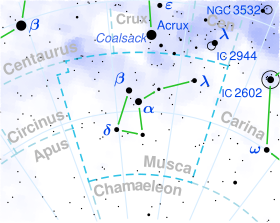S Muscae is a classical (δ) Cepheid variable star in the constellation Musca about 2,600 light years away.
| Observation data Epoch J2000 Equinox J2000 | |
|---|---|
| Constellation | Musca |
| Right ascension | 12h 12m 47.01834s[1] |
| Declination | −70° 09′ 06.4363″[1] |
| Apparent magnitude (V) | 6.394[2] (5.89 - 6.49[3]) |
| Characteristics | |
| Spectral type | F6Ib (F6-G0[3]) + B5V[4] |
| U−B color index | +0.66[5] |
| B−V color index | +1.00[5] |
| Variable type | δ Cepheid[3] |
| Astrometry | |
| Radial velocity (Rv) | −1.91[6] km/s |
| Proper motion (μ) | RA: −7.79[1] mas/yr Dec.: −0.60[1] mas/yr |
| Parallax (π) | 1.99 ± 0.84 mas[1] |
| Distance | 863[2] pc |
| Absolute magnitude (MV) | −4.01[7] |
| Orbit[7][8] | |
| Period (P) | 504.9 ± 0.07 |
| Semi-major axis (a) | 794 AU |
| Eccentricity (e) | 0.08 ± 0.002 |
| Inclination (i) | 32 ± 1° |
| Semi-amplitude (K1) (primary) | 14.7 ± 0.2 km/s |
| Details | |
| Mass | 6.2[7] M☉ |
| Radius | 65.1[2] R☉ |
| Luminosity | 3,467[7] L☉ |
| Metallicity | +0.18[9] |
| companion | |
| Mass | 5.3[7] M☉ |
| Temperature | 17,000[10] K |
| Other designations | |
| Database references | |
| SIMBAD | data |

S Muscae is a yellow supergiant ranging between spectral types F6Ib and G0Ib and magnitudes 5.89 to 6.49 over a period of 9.66 days.[3] It is a luminous star around six times as massive as the Sun and 65.1 times the radius of the Sun. It is a binary star with a blue-white main sequence star companion likely to be of spectral type B3V to B5V with a mass of just over five solar masses,[12] one of the hottest and brightest companions of a Cepheid known. The two stars orbit each other every 505 days.[13]
S Muscae has been found to lie within the faint star cluster ASCC 69.[14]
References
edit- ^ a b c d e Van Leeuwen, F. (2007). "Validation of the new Hipparcos reduction". Astronomy and Astrophysics. 474 (2): 653–664. arXiv:0708.1752. Bibcode:2007A&A...474..653V. doi:10.1051/0004-6361:20078357. S2CID 18759600.
- ^ a b c Moskalik, P.; Gorynya, N. A. (2005). "Mean Angular Diameters and Angular Diameter Amplitudes of Bright Cepheids". Acta Astronomica. 55: 247. arXiv:astro-ph/0507076. Bibcode:2005AcA....55..247M.
- ^ a b c d Samus, N. N.; Durlevich, O. V.; et al. (2009). "VizieR Online Data Catalog: General Catalogue of Variable Stars (Samus+ 2007-2013)". VizieR On-line Data Catalog: B/GCVS. Originally Published in: 2009yCat....102025S. 1. Bibcode:2009yCat....102025S.
- ^ Skiff, B. A. (2014). "VizieR Online Data Catalog: Catalogue of Stellar Spectral Classifications (Skiff, 2009-2014)". VizieR On-line Data Catalog: B/Mk. Originally Published in: Lowell Observatory (October 2014). 1. Bibcode:2014yCat....1.2023S.
- ^ a b Ducati, J. R. (2002). "VizieR Online Data Catalog: Catalogue of Stellar Photometry in Johnson's 11-color system". CDS/ADC Collection of Electronic Catalogues. 2237. Bibcode:2002yCat.2237....0D.
- ^ Pourbaix, D.; Tokovinin, A. A.; Batten, A. H.; Fekel, F. C.; Hartkopf, W. I.; Levato, H.; Morrell, N. I.; Torres, G.; Udry, S. (2004). "SB9: The ninth catalogue of spectroscopic binary orbits". Astronomy and Astrophysics. 424 (2): 727–732. arXiv:astro-ph/0406573. Bibcode:2004A&A...424..727P. doi:10.1051/0004-6361:20041213. S2CID 119387088.
- ^ a b c d e Remage Evans, Nancy; Bond, Howard E.; Schaefer, Gail H.; Mason, Brian D.; Karovska, Margarita; Tingle, Evan (2013). "Binary Cepheids: Separations and Mass Ratios in 5 M ⊙ Binaries". The Astronomical Journal. 146 (4): 93. arXiv:1307.7123. Bibcode:2013AJ....146...93E. doi:10.1088/0004-6256/146/4/93. S2CID 34133110.
- ^ Petterson, O. K. L.; Cottrell, P. L.; Albrow, M. D. (2004). "The orbits of southern binary Cepheids". Monthly Notices of the Royal Astronomical Society. 350 (1): 95–112. Bibcode:2004MNRAS.350...95P. doi:10.1111/j.1365-2966.2004.07555.x.
- ^ Klagyivik, P.; Szabados, L. (2009). "Observational studies of Cepheid amplitudes. I. Period-amplitude relationships for Galactic Cepheids and interrelation of amplitudes". Astronomy and Astrophysics. 504 (3): 959. arXiv:0908.3561. Bibcode:2009A&A...504..959K. doi:10.1051/0004-6361/200811464. S2CID 18283579.
- ^ Evans, Nancy Remage; Massa, Derck; Fullerton, Alexander; Sonneborn, George; Iping, Rosina (2006). "Cepheid Masses: FUSE Observations of S Muscae". The Astrophysical Journal. 647 (2): 1387–1392. arXiv:astro-ph/0607489. Bibcode:2006ApJ...647.1387E. doi:10.1086/505519. S2CID 119020617.
- ^ "MAST: Barbara A. Mikulski Archive for Space Telescopes". Space Telescope Science Institute. Retrieved 8 December 2021.
- ^ Bohm-Vitense, Erika; Remage Evans, Nancy; Carpenter, Kenneth; Beck-Winchatz, Bernhard; et al. (1997). "The Mass of the Classical Cepheid S Muscae". The Astrophysical Journal. 477 (2): 916. Bibcode:1997ApJ...477..916B. doi:10.1086/303725.
- ^ Evans, Nancy Remage (1990). "The orbit and colors of the Cepheid S MUSCAE". Publications of the Astronomical Society of the Pacific. 102: 551. Bibcode:1990PASP..102..551E. doi:10.1086/132668.
- ^ Remage Evans, Nancy; Pillitteri, Ignazio; Wolk, Scott; Guinan, Edward; Engle, Scott; Bond, Howard E.; Schaefer, Gail H.; Karovska, Margarita; Depasquale, Joseph; Tingle, Evan (2014). "X-Ray Detection of the Cluster Containing the Cepheid S Mus". The Astrophysical Journal Letters. 785 (2): L25. arXiv:1403.6939. Bibcode:2014ApJ...785L..25E. doi:10.1088/2041-8205/785/2/L25. S2CID 119113620.
